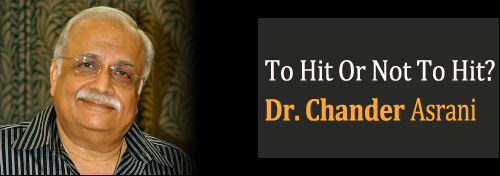To Hit Or Not To Hit?
If you had children, you would know how difficult it is to keep cool. I will talk to you after you have 2 of your own”. It was 1979. I was admonishing a mother who had hit her daughter as she was beating her younger sister. I had to keep quiet, as I knew well enough that there is vast difference between theory and practical.
Today, 34 years later, I can say with my head held high that I did not, even once, hit any of my 3 darlings and yes they were still scared of making me angry.
Still, if you care to ask, physical punishment to a child is a big controversial topic with most parents shouting, “Nnooooooooo! How can you?”
But the same parent, after their first episode of hitting the child, will come out with, “But it was not a punishment, only to discipline him” or “I don’t know what got into me?” or “I could never guess she can be so stubborn” or “she has fallen into bad company”, the last being a 3-year-old girl.
Those against physical punishment, put forth several good arguments for not using it ever (all 100% true):
- Hitting them is actually release of parent’s pent-up anger (not related to the incidence in question.)
- Most parents, who claim they resort to beating as the last thing, find later in life that they had unknowingly fuelled their child’s determination.
- Physical punishment teaches a child that it is acceptable to hit out when angry.
- It erodes child’s self confidence – any child’s self-image depends on how he perceives that others, especially parents, perceive him. Hitting devalues this self image, more so if in front of others.
Several parents prefer a particular form of ‘hitting’ over physically ‘hitting’ the child – verbal or emotional hitting and most parents resort to this form under guise of “I never hit my child”. Verbal and/or emotional ‘hitting’ is very subtle but leaves much deeper scars than physical punishment.
Recall, whether you are guilty of using such terms implying some sort of abandoning the child – physical or emotional?
Now! If you don’t behave, I am leaving”
Oh! God, how I wish I had listened to your dad and not had a child”
One day I am going to die; who will you harass then?”
I am going to nanima’s house. You manage with dad.”
Being a counselor, I also know that hitting is impulsive and if you still feel the need to occasionally hit your child, please be CAREFUL that you are not overdoing it and don’t have to live your life with a regret.
- Never hit on the face, head or the ear. Instead target buttocks, legs or arms. Hitting a child on the face is demeaning as well as dangerous since a hard hit on the cheek/ear may lead to a perforated eardrum.
- Hit only with an open hand through clothing, never use a fist. Using an object, even a ruler, makes it difficult to judge how hard you are hitting.
- Belts and serving spoons should never be used.
- Mothers better be careful in the kitchen; many kids are living with burn marks on the face! Make a rule – I will not lose my temper in the kitchen
- Hit only once! After all you are trying to punish (discipline). Hitting more than once is only relieving your anger and not teaching your child anything additional.
- Never hit your child when YOU ARE out of control. Remember hitting him is for disciplining and not to punish. If you can’t control your rage, you need help more than your child.
- Some parents have a habit of vigorously shaking children in lieu of hitting as it calms them down. DON’T do it as it carries a serious risk of causing blood clots in the brain (subdural haematomas).
Discipline is more of self-control than teaching the other person (child).
Remember, a guilt filled hug or buying a toy after hitting does not work and if you are dealing with a 4+ child, it may actually prompt him to abuse your guilt/regret.
Finally, if we wish to control a child’s misbehavior; we must ensure that we are not misbehaving!
Dr Chander Asrani, father to three daughters and grand father to one, is a post-graduate in Family Medicine. He has over 35 years in clinical practice, launched www.growingwell.com in 2000 and since then has been writing on various subjects. Know more about him at about.me/drasrani.
